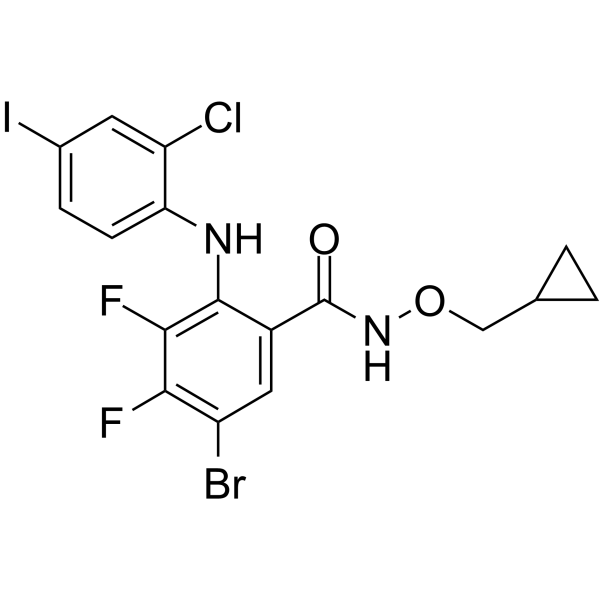
PD184161
CAS No. 212631-67-9
PD184161( PD 184161 )
Catalog No. M27439 CAS No. 212631-67-9
PD184161 is a novel, orally-active MEK inhibitor.
Purity : >98% (HPLC)
 COA
COA
 Datasheet
Datasheet
 HNMR
HNMR
 HPLC
HPLC
 MSDS
MSDS
 Handing Instructions
Handing Instructions
| Size | Price / USD | Stock | Quantity |
| 2MG | 40 | Get Quote |


|
| 5MG | 65 | Get Quote |


|
| 10MG | 115 | Get Quote |


|
| 25MG | 258 | Get Quote |


|
| 50MG | 430 | Get Quote |


|
| 100MG | 619 | Get Quote |


|
| 200MG | 888 | Get Quote |


|
| 500MG | 1332 | Get Quote |


|
| 1G | Get Quote | Get Quote |


|
Biological Information
-
Product NamePD184161
-
NoteResearch use only, not for human use.
-
Brief DescriptionPD184161 is a novel, orally-active MEK inhibitor.
-
DescriptionPD184161 is a novel, orally-active MEK inhibitor. PD184161 inhibited MEK activity (IC50 = 10-100 nM) in a time- and concentration-dependent manner.(In Vitro):PD184161 inhibited MEK activity (IC50 = 10-100 nM) in a time- and concentration-dependent manner more effectively than PD098059 or U0126. PD184161 inhibited cell proliferation and induced apoptosis at concentrations of > or = 1.0 microM in a time- and concentration-dependent manner. (In Vivo):In vivo, tumor xenograft P-ERK levels were significantly reduced 3 to 12 hours after an oral dose of PD184161 (P < .05). Contrarily, tumor xenograft P-ERK levels following long-term (24 days) daily dosing of PD184161 were refractory to this signaling effect. PD184161 significantly suppressed tumor engraftment and initial growth (P < .0001); however, established tumors were not significantly affected. In conclusion, PD184161 has antitumor effects in HCC in vivo that appear to correlate with suppression of MEK activity .
-
In VitroPD184161 (1-20 μM; 24, 48, or 72 hours) inhibits cell proliferation and induces apoptosis in a time and concentration dependent manner.PD184161 (0.1 and 1.0 μM; 1 hour) inhibits ERK1,2 phosphorylation.PD184161 (5 μM; 30 min) prevents the toxic effects of bicuculline. Cell Proliferation Assay Cell Line:HCC cell lines (HepG2, Hep3B, PLC, and SKHep)Concentration:1-20 μM Incubation Time:24, 48, or 72 hours Result:Inhibited cell proliferation.Apoptosis Analysis Cell Line:HCC cell lines (HepG2, Hep3B, PLC, and SKHep)Concentration:1-20 μM Incubation Time:48 hours Result:Induced cell apoptosis.Western Blot Analysis Cell Line:HCC cell lines (HepG2, Hep3B, PLC, and SKHep)Concentration:0.1 and 1.0 μM Incubation Time:1 hours Result:Inhibited ERK1,2 phosphorylation.Cell Viability Assay Cell Line:Primary mouse neurons Concentration:5 μM Incubation Time:30 min Result:Prevents the toxic effects of bicuculline.
-
In VivoPD184161 reduces tumor xenograft P-ERK levels in 3-12 hours after an oral dose.PD184161 (300 mg/kg; orogastric gavage twice daily for 38 days) significantly suppresses tumor engraftment and initial growth.PD184161 (30 mg/kg; i.p.; single injection) produces depressive-like behavior.PD184161 (500 μg/kg; intravenous injection) prevents the progression of neurological deficits and brain damage after stroke. Animal Model:Hep3B tumor xenografts BALB/c athymic nude miceDosage:300 mg/kg Administration:Orogastric gavage twice daily for 38 days Result:Decreased the early tumor growth.Animal Model:Male, 6 weeks C57Bl/6 mice Dosage:500 μg/kg Administration:intravenously in 30 min before MCAO or PTZ administration Result:Prevented the progression of neurological deficits and brain damage after stroke.Animal Model:C57Bl/6 mice Dosage:30 mg/kg Administration:i.p., single injection Result:Produced depressive-like behavior.
-
SynonymsPD 184161
-
PathwayMAPK/ERK Signaling
-
TargetMEK
-
RecptorNO Synthase
-
Research Area——
-
Indication——
Chemical Information
-
CAS Number212631-67-9
-
Formula Weight557.56
-
Molecular FormulaC17H13BrClF2IN2O2
-
Purity>98% (HPLC)
-
SolubilityIn Vitro:?DMSO : 100 mg/mL (179.35 mM)
-
SMILESFc1c(F)c(Nc2ccc(I)cc2Cl)c(cc1Br)C(=O)NOCC1CC1
-
Chemical Name——
Shipping & Storage Information
-
Storage(-20℃)
-
ShippingWith Ice Pack
-
Stability≥ 2 years
Reference
1.Akihisa T, et al. Cucurbitane glycosides from the fruits of Siraitia gros venorii and their inhibitory effects on Epstein-Barr virus activation. J Nat Prod. 2007 May;70(5):783-8.
molnova catalog



related products



 Cart
Cart
 sales@molnova.com
sales@molnova.com


